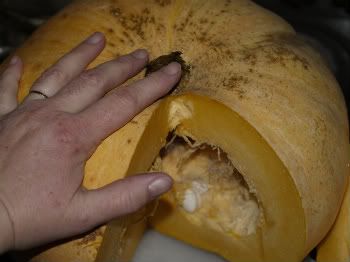I will have enough plants to put in my cramped garden this year, but either I must save seeds for next year, or buy some more. I was delighted to find that Lily’s Nursery behind Tom’s Farm Shop on the B1022 between Tiptree and Maldon is selling “Seeds of Italy”. I met the owner of Seeds of Italy, Paolo Arrigo, at Hampton Court Flower Show a few years ago, and bought some Squash seeds from him. He had just started importing to Britain, if I recall correctly (though I may have that wrong.) They were the most delicious squash, but the last couple of years have been too dull for them to do well (Remember what I said about curcurbits needing sunshine to make female flowers). In my shady garden this is something of a problem. But the taste…
Anyway, back to the seeds. The owner of Lily’s Nursery has told me she can order in seeds from Seeds of Italy for customers, and she has a stock of the more commonly grown seeds, including the climbing purple beans (rampicant). So even if I fail to collect my own seeds this year, I can still easily get hold of these delicious beans in future. I took home a catalogue, and of course, that means I will be tempted to buy some unusual seeds, even though I have no space to grow them. What I really need is an allotment, and the time to tend it. I had an allotment where I used to live, conveniently two hundred yards from my front door. I never really had the time to make the best use of it, and regret trying to be organic from the start, but it was lovely and I really miss it, especially as I put fruit trees on it and they have matured now. A friend took it over, and I am grateful because it makes me feel all the effort was worth it.
I’m trying to remember which year it was we went to Tuscany, and it must be three or four years ago, maybe more. We stayed in a villa outside a small town called Regello. We used to walk into the town to do the shopping, and it was great being able to snoop into people’s gardens on the walk down. People seem to have a permaculture or cottage garden approach, with food growing nestled up to ornamental plants, such that alimentary considerations come first, and ornamentals are a luxury added in as and where the space allows. Many gardens have an outdoor grill, not the formalised charcoal-guzzling barbies we have in this country, but a stone-built permanent outdoor cooking facility burning local wood, such as chestnut. On an evening or on Sunday we would smell delicious smoke and cooking smells arising from these. The family would be gathered round, doing things together. We noticed that families behave as families in restaurants too, with everyone accommodated round the tables, from ancient Great-Granny to babbling infant, all enjoying food, all enjoying company, wine, and the ambience of the evening. We seem to have lost that habit in this country, if we ever had it. It might have something to do with our climate where eating outdoors is only pleasant when it’s really warm, which happens infrequently so is an effort to do. In Italy, eating outdoors seems to be the default situation, certainly in the summer.
Many of the dwellings had their own vines growing over sheep-netting pinned to wooden stakes (possibly chestnut) which made shady areas for sitting, for growing other crops, or for their chickens to enjoy a bit of shade. This looked rustic and rickety, but it did the job.
Curcurbits rambled over the gardens, and there were small olive groves, the sand- coloured soil in between the trees recently turned over by small plough or rotavator (I didn’t see what had made the furrows). Some of the grape vines were a startling blue from Bordeaux mixture applied against mildew. Irises were nestled in vacant spots. One thing I did wonder about was the lack of mulch in such sandy looking soil. I presume what the ploughing does is make the top layer of soil act as a dry mulch. The moisture is kept in the soil because the capillary action to the surface is broken by the layer of dust. Hoeing does the same job. I prefer using mulches at home as our soil is so stony it’s like gardening on ballast. I’m also lazy and cutting down on weeding is a big plus for me.
Food from the garden seems imbedded in the Italian psyche, or perhaps it’s that good food of any description is embedded in the Italian psyche. There is nothing fresher than your own crops picked and eaten within hours. Certainly where we stayed the supermarkets were full of good quality food, and the corner shops sold the local pressed olive oil (which is delicious). I got the feeling that synthetic food as found in our supermarkets would have found short shrift there. (That's not to say that all food in supermarkets is synthetic, far from it, but the cheap stuff is. By synthetic I mean plumped up and flavoured with chemicals and other water-binding additives.)
The other thing that interested me was the Italian obsession with culture. No sense there, that art was somehow a highbrow activity to be spurned by the ordinary man. It was embraced by all, enjoyed and rejoiced in by all. We went to a peripatetic art exhibition in one of the churches and saw some really famous modern pieces… mostly not my taste, but worth seeing. And the amazing thing was this was in a small church hall in a small town in Tuscany, not in the city of Florence. People were proud of their heritage and culture. I compare this with our country where the population worship Celebs and TV tripe suffused into unthinking brains through uncaring eyes. Maybe I’m being unfair and I saw the best of Italian country culture and they too have their Soma-TV Celeb worshippers. But I get the feeling that to Italians their culture is too ingrained and too beloved to abandon.
Of course when I came home I wanted to reproduce what I’d seen here (this is the hazard of going on holiday and happens often.) The squashes I grew were not very productive but were very tasty. However, the following year was disastrously gloomy, which is why last year I decided to track down some Gelber zentner squash seeds. I bought a packet of these in Iceland many years ago. I figured if they grew them in Iceland’s grow-light systems then these might not be as sun-demanding for forming female flowers, and certainly I got two good pumpkins last year (in someone else’s garden, which I borrowed a bit of space in.) They have grown in my garden very well in previous years, though. I’ll see how they do this year. I am tempted to squeeze in some of the Italian ones, up a trellis, perhaps. I’ll see.

Over the last couple of years there has been a great resurgence of growing your own veg, which is great, but gardens have grown smaller and smaller until many new-build properties have a garden which is literally an “out-door room”. So I’m quite lucky to have some space for a greenhouse and a few veg, as well as the ornamental part of the back garden. During and after the last War, growing your own became a necessity to keep the nation fed. We lost that skill and passion, gradually, over the Seventies and Eighties, with more leisure time taken up with TV and more modern pastimes. At the same time, foreign holidays introduced us to many more varied foods. I remember when olive oil was something you bought at the chemist’s, and I don’t think it was Extra Virgin, somehow. The only melons available were Honeydew, which seems a bit of a misnomer, because the only way they were really palatable was by sprinkling cinnamon on them. It was considered dead posh to have a slice of melon as a starter (or prawn salad… remember that?) One thing supermarkets have done is import exotic fruit and vegetables at a price we can all afford. But at the same time they have demanded long-life tomatoes, strawberries, peaches and other fruits, which producers have developed, so now we have crunchy fruit which should be soft and succulent. Tomatoes have lost that acid/sweet balance and lusciousness in favour of uniformity and transportability. And we have let it happen because it makes food cheap, affordable, when so much of our income goes on providing a roof over our head.
We might envy the Italians their lifestyle, yet I saw real monetary poverty there. There were people from the hills well down-at-heel, though the supermarket owners took care that they had the rinds from grinding Parmesan for free, and off cuts of meat very cheaply. The town looked after its own. I got the impression that there wasn’t a lot of extra cash to fritter away on new clothes or trivia. But they haven’t sold out to the supermarket and small gods of commerce in the same was as we have. They have retained pleasure in the fundamentals of life, such as sharing good food with your loved ones.
It’s time this country had a backlash against the inane drivel which makes up our daily lives, and got back to some of these basic values. There is a groundswell rising, and I think we can all feel it.

No comments:
Post a Comment